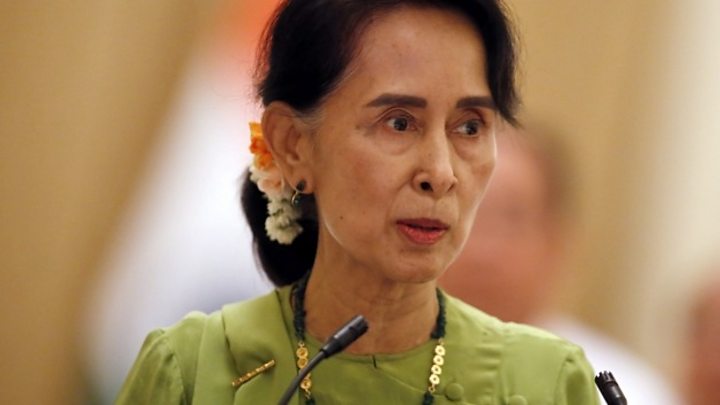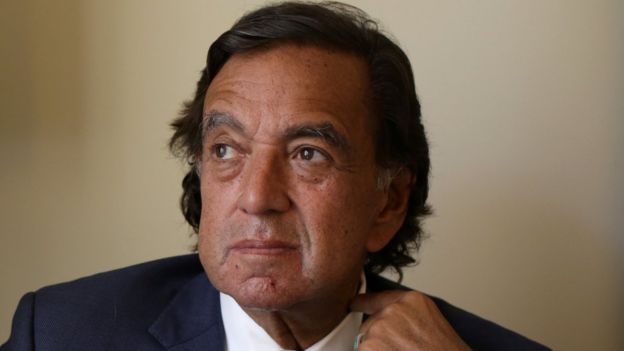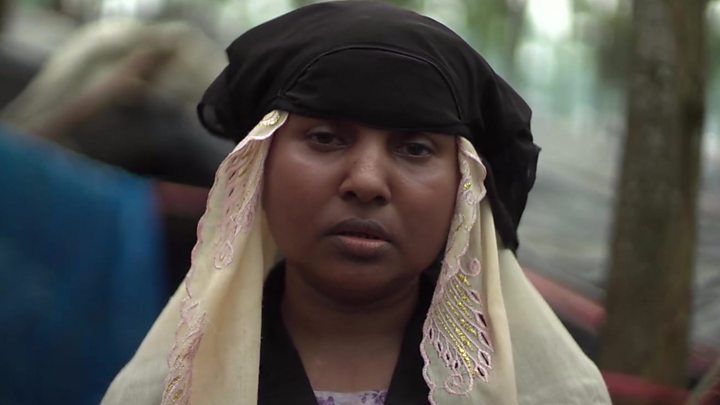
Veteran US diplomat Bill Richardson has resigned from an international panel set up by Myanmar leader Aung San Suu Kyi to advise on the Rohingya crisis.
He claimed the panel was a "whitewash" and accused Ms Suu Kyi, his long-time friend, of lacking "moral leadership".
Myanmar accused him of pursuing "his own agenda".
More than 650,000 Rohingya people, from a mostly-Muslim minority in Buddhist Myanmar, fled to Bangladesh last year in the face of a military crackdown.
Many are now living in refugee camps in the neighbouring country. Bangladesh has said they will all be returned to Myanmar within two years.
Mr Richardson added that Ms Suu Kyi had been "furious" when he raised the case of two Reuters reporters on trial in Myanmar.
The journalists have been charged with breaching the Official Secrets Actwhile working on coverage of the Rohingya crisis.
Ms Suu Kyi "exploded" at Mr Richardson when he mentioned the journalists, he told the New York Times.
"Her face was quivering, and if she had been a little closer to me, she might have hit me, she was so furious," Mr Richardson said.
 REUTERS
REUTERS
Mr Richardson, a former adviser to the Clinton administration, has known Ms Suu Kyi for decades and visited the Nobel laureate while she was under house arrest in the 1990s.
He told Reuters he was resigning from the advisory board because it was a "whitewash" and he did not want to be part of a "cheerleading squad for the government".
He was "alarmed by the lack of sincerity with which the critical issue of citizenship was discussed," he wrote in a statement.
What has happened to the Rohingya?

There were around one million Rohingya people in Myanmar at the start of 2017, where they have their own language and culture. But the government sees them as illegal immigrants from Bangladesh and denies them citizenship.
In August last year, after Rohingya militants in Rakhine state attacked police posts, people started to flee across the border. Arriving in Bangladesh, they told repeated stories of troops, backed by local Buddhist mobs, burning villages and attacking and killing civilians.
The military offensive has been described by the United Nations as a "textbook example of ethnic cleansing" - something Myanmar denies.
- What you need to know about the Rohingya crisis
- Could Aung San Suu Kyi face genocide charges?
- Seeing through the official story in Myanmar
Mr Richardson went on to say he had been "taken aback by the vigour" with which Ms Suu Kyi had "disparaged" the media, the UN, human rights groups and the international community during three days of meetings.
"She's not getting good advice from her team," he said.
"I like her enormously and respect her. But she has not shown moral leadership on the Rakhine issue and the allegations made, and I regret that."
Myanmar's government said Mr Richardson was pursuing "his own agenda" and the government had decided his continued participation on the board was "not in the best interest of all concerned".
The Advisory Board for the Committee for Implementation of the Recommendations on Rakhine State was set up by Ms Suu Kyi's government last year.
Blistering criticism
BBC South East Asia correspondent Jonathan Head
Rarely can such blistering criticism have come from a seasoned diplomat of a woman whose cause he once championed, and whom he considered a friend.
Ms Suu Kyi's government has denied allegations of horrific human rights abuses and stubbornly resisted pressure to allow international organisations access to Rakhine state. Bill Richardson's fear that the board could be just a cheerleader for the government may be quietly shared by other members and his reservations will have surprised few.
But strong and personal reproaches of Ms Suu Kyi's attitude may destroy a personal relationship going back more than two decades.
She is known to be intolerant of such slights and strong-willed to the point of stubbornness.
There is little likelihood that she will change her views because of his comments. More likely they will compound a sense, shared by her millions of supporters, that western governments and political leaders are treating her unfairly, and that she should look elsewhere for sympathy.
Until Mr Richardson resigned, the board had 10 members, five of whom are from overseas.
One of those, former South African Defence Minister Roelof Meyer, travelled with the board's remaining members to Rakhine state on Wednesday.
He told Reuters the visit had been "very constructive", and said any suggestion the board was "just a rubber stamp or a voice on behalf of the government... would be completely untrue, unfair. We haven't done any recommendations so far."
Another member of the board, Khin Nyo, told the BBC that Mr Richardson was asked not to urge for the release of the Reuters journalists in the meeting as it did not concern the board.
"The advisory board is independent and [the government] don't restrict anything on us," she said.
Asia
The evolution of Australia Day controversy
- 25 January 2018
- Australia
Man hit by train in quest for perfect selfie
- 25 January 2018
- India
India violence as Hindu queen film opens
- 25 January 2018
- India









No comments:
Post a Comment